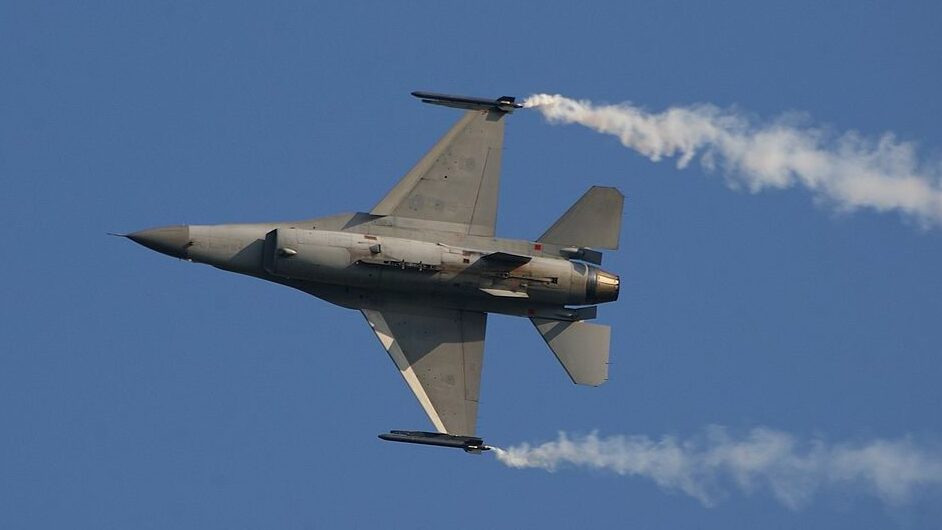
Photo: Konflikty.pl, via Wikimedia Commons
Belgian Prime Minister Alexander De Croo and Ukrainian President Volodymyr Zelensky signed a military deal in Brussels on Tuesday, May 28th, which includes Belgium sending thirty F-16 fighter planes to Ukraine in the next four years.
“The document includes at least €977 million in Belgian military aid to Ukraine this year, as well as Belgium’s commitment to providing our country with support over the course of the agreement’s ten-year term,” Zelensky tweeted, adding that the agreement includes guarantees by Belgium to aid Ukraine with “modern armoured vehicles, equipment to meet Ukraine’s air force and air defense needs, naval security, mine clearance, participation in the artillery ammunition coalition, and military training.”
Today in Brussels, Prime Minister @AlexanderDeCroo and I signed a bilateral security and long-term support agreement between Ukraine and Belgium.
— Volodymyr Zelenskyy / Володимир Зеленський (@ZelenskyyUa) May 28, 2024
The document includes at least €977 million in Belgian military aid to Ukraine this year, as well as Belgium's commitment to…
This was Zelensky’s second stop of a European tour which started with Spain on Monday and continues with Portugal on Tuesday. Spain pledged one billion euros in military aid as Prime Minister Pedro Sánchez and Zelensky signed their own security deal in Madrid. Ukraine has signed similar bilateral accords with nine other countries: the United Kingdom, Germany, France, Denmark, Italy, Canada, the Netherlands, Finland, and Latvia.
Zelensky wants his Western allies to shore up support for Ukraine, which is losing ground in its war with Russia. Russian troops are slowly advancing and occupying Ukrainian territory, while the defending army is badly in need of more soldiers, equipment and weapons.
NATO and EU member countries are not only willing to assist Kyiv but are seemingly playing, or considering playing, a more active role in the war itself. As German daily Bild reported on Monday, NATO member states, especially the Baltic countries, Britain, and Canada are urging the alliance to move some NATO operations to within Ukrainian territory—such as sending NATO military instructors to train Ukrainian soldiers and using NATO air defence systems in Poland to protect the western areas of the war-torn country.
Hungarian Foreign Minister Péter Szijjártó was harshly criticised at an EU foreign ministers’ meeting for blocking further EU military aid to Ukraine. Szijjártó lambasted the plans, calling them an escalation of the war.
The plans come on the heels of French President Emmanuel Macron’s controversial and divisive comments, repeatedly saying that sending Western troops to Ukraine should not be ruled out. In a sign that these plans are coming to fruition, Ukraine’s top commander, Oleksandr Syrskyi said on Monday he had signed paperwork allowing French military instructors to visit Ukrainian training centres soon. He gave no further details, but the Ukrainian Defence Ministry later clarified his words, saying, “We are still in discussions with France and other countries on this issue.” France’s Defence Ministry also gave a vaguely worded statement, saying “training on Ukrainian soil is one of the projects discussed since the conference on support for Ukraine” held in February.
Estonian Prime Minister Kaja Kallas last week said that “there are countries who are training soldiers on the ground already,” but did not name any specific countries or provide further details. She insisted that sending military instructors to Ukraine would not draw NATO into war with Russia, as some ally countries fear.
Polish Foreign Minister Radosław Sikorski believes Poland shouldn’t rule out the possibility of sending its troops to Ukraine, either. Asked in an interview, published on Tuesday, whether Poland was ready to send troops to Ukraine, Sikorski said: “We shouldn’t rule it out. We should leave [Russian President] Putin guessing as to our intentions.”
